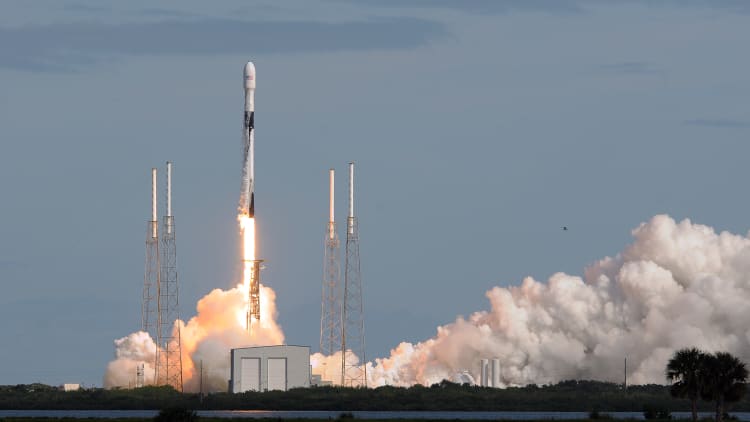Private investment in space companies last year set a new annual record, defying industry fears that Covid-19 would stop the past decade's momentum, according to a report Monday by New York-based firm Space Capital.
"With another $2.9 billion invested in Q4, 2020 was a record year for [space infrastructure companies] with $8.9 billion invested," Space Capital managing partner Chad Anderson wrote in the report. "Despite expectations that Infrastructure would be hardest hit by the pandemic, 2020 turned out to be a record for investment."
The quarterly Space Capital report divides investment in the industry into three technology layers, with space infrastructure including what many would typically consider to be space companies: Those that build rockets and satellites, such as SpaceX, Blue Origin, Relativity Space, Rocket Lab, Planet Labs and Spire Global.
In addition to record investment, there were also 24 exits for infrastructure space companies in 2020, with investors liquidating $7.9 billion of value. An exit happens when the company owner or investor can sell the firm to an outside party.
"Nearly all of the Infrastructure exits over the past decade have come in the form of acquisitions," Anderson wrote. "The low-interest rate environment has acted as a tailwind for M&A activity with 2020 being the most active year on record."
Overall, Space Capital found that the infrastructure layer has brought in $30.9 billion in total equity investment since 2011.
The other two layers in the report are application and distribution – the former of which includes space-dependent services like ride-hailing or navigation and the latter of which represents terrestrial-based technologies that connect to space-based networks – which in 2020 brought in $15.9 billion and $800 million, respectively.
Amazon and Microsoft ones to watch in 2021

Additionally, Space Capital's Q4 report highlighted the "accelerating space ambitions" of Amazon and Microsoft as "one of the most overlooked stories of 2020, which we expect to have a significant impact in 2021 and beyond."
The two tech giants made several space moves last year.
Amazon set up a new unit within its Amazon Web Services (AWS) cloud division, as well as made progress with its Project Kuiper satellite internet program. Microsoft unveiled its Azure Orbital service in partnership with SpaceX's Starlink as a competitor to Amazon's existing AWS Ground Station service.
"Azure Space and AWS Space are removing complexity across the value chain, making a global network of space-based communication and data collection infrastructure accessible to the tech community to innovate upon," Anderson wrote.
"In the same way that every company today is a technology company, the companies of tomorrow will all be space companies," he added.
Subscribe to CNBC PRO for exclusive insights and analysis, and live business day programming from around the world.


